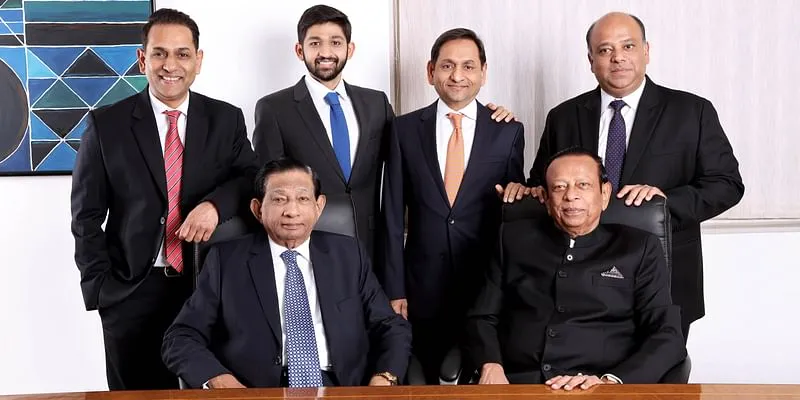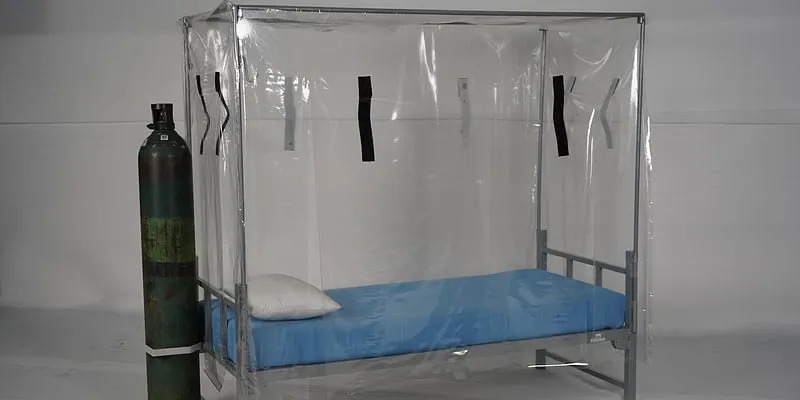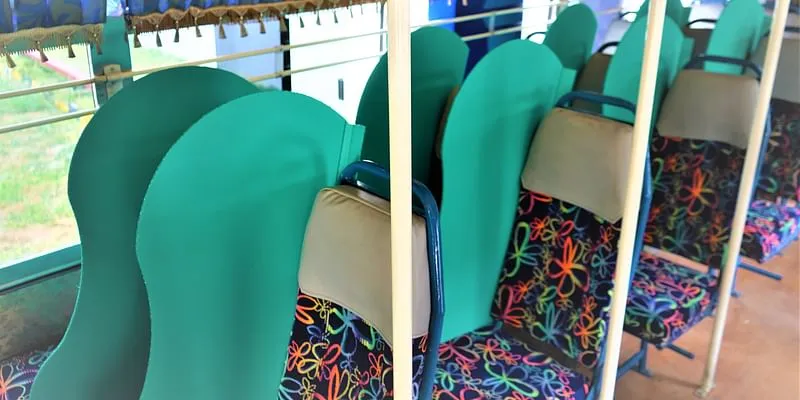Nilkamal's journey to becoming a Rs 2,200 Cr turnover company that started from manufacturing plastic household items
Started at a rented premise in Mumbai, Nilkamal diversified from manufacturing plastic buckets to material handling, furniture, mattresses and packaging businesses. It recently donated beds for people in need in collaboration with Reliance Foundation to help fight COVID-19.

Mihir Parekh, Executive Director, Nilkamal Limited
In 1981, Vamanrai Parekh and Sharad Parekh decided to step out of the family business of manufacturing buttons and delve into making plastics, which was gaining prominence in the market.
The brothers started a small business of manufacturing plastic household items in a rented premise in Powai, Mumbai, including buckets, baskets, mugs, etc. Thus began Nilkamal Plastics, which later became Nilkamal Limited. At the time, little did the brothers know that their small business would churn big profits, becoming a household name for everyday needs.
Over the last four decades, Nilkamal has garnered a strong legacy and gained the consumer’s trust.
In an interaction with SMBStory, Mihir Parekh, the third-generation entrepreneur and current Executive Director of Nilkmal Limited, takes us through the business journey and talks about how the company withstood the changing times by constantly innovating, based on market trends.
Paving the B2C and B2B segment
While Vamanrai and Sharad were running the plastic household items business, they thoroughly researched the market to expand further. One day, while passing Worli Dairy, the duo saw wooden crates being used to carry the milk bottles.
However, the brothers realised that plastic crates would be easier to handle, more durable, and cheaper.
“Around 1,000 crates were being used in one dairy, and my grandfather and his brother saw a huge opportunity in the material handling segment. Hence, in the mid-80s, they started manufacturing crates by setting up another unit in Andheri, Mumbai, and entered the B2B segment,” Mihir tells SMBStory.
In the late 80s, the brothers were attending an exhibition in Germany, where they saw long rows of plastic chairs. At the time, Indians were using wooden or metal chairs, and plastic furniture wasn’t in demand. But Vamanrai and Sharad placed an order for the chair mould in Germany and decided to manufacture plastic chairs in India. Hence began Nilkamal’s furniture manufacturing vertical.
Expanding the business and diversifying into other vertical requires a large amount of funds. Being a bootstrapped company, which would pour its profits back into the business, the brothers realised going public would be a recourse. However, the economic situation in the early 90s was not favourable. Mihir says,
“My grandfather thought that going public is the best way to increase business capacity and gain consumer trust. However, in 1991, when he planned to get listed, the Gulf War broke out. Oil prices were skyrocketing, and India had a trade deficit. Still, they went public and received an overwhelming response — our shares were oversubscribed 6.5 times.”
Since then, there has been no looking back for Nilkamal. The company expanded its material handling business, which now includes plastic pallets, insulated iceboxes and fish tubs, waste management tools, and road safety products. It also produces hospitality solutions, aquaculture fish cages, maintenance hole chambers, ripening solutions, material handling equipment, metal shelving, and racking systems. Nilkamal also further expanded its furniture portfolio in the later years.

(Standing, from left to right) Manish Parekh - Executive Director (Furniture), Mihir Parekh - Executive Director and Founder of the BUBBLEGUARD DIVISION, Hiten Parekh - Joint Managing Director, Nayan Parekh - Executive Director (Material Handling).
In the late 90s, second-generation entrepreneurs Hiten Parekh, Nayan Parekh and Manish Parekh carried the brand legacy forward, steadily expanding in the furniture vertical. Today, it offers a range of bedroom furniture sets.
With over 2,000 distributors who supply Nilkamal products to 19,000 retail points, and with a sales team of more than 400 who manage its B2B segment, the company rakes in a turnover of more than Rs 2,200 crore.
Nilkamal has 11 manufacturing units, 10 of which are located across India, and one is in Sri Lanka. For the B2B segment, the company’s list of clients includes Pepsico India, The Coca-Cola Company India, Maruti, and Volkswagen, among others.
In 2005, the company also launched ‘@Home’, a furniture retail chain that now has around 45 stores — both company-owned and franchise stores — across India. In 2012, the company came up with Nilkamal Matrezzz, and in 2019, it launched Doctor Dreams — a mattress brand to cater to online customers.
Exploring the packaging industry
In 2015, Mihir joined the family business after working in the investment banking industry for two years. Taking forward the family-run business in collaboration with the first- and second-generation entrepreneurs, Mihir says that he wanted to innovate further.
Seeing a gap in the packaging industry, he came up with the idea to launch Nilkamal BubbleGUARD, a range of unique honeycomb-structured boards, to change the face of printing, packaging, and protection.
The brand provides packaging, printing, and panelling that find usage in industries like construction, automotive, steelworks, furniture, F&B, advertising, decor, and logistics. Started with 200 GSM (Grams per Square Metre), Mihir expanded the brand’s range to 3,500 GSM to replace the less efficient contemporary materials for printing, packaging, and protection.
Pivoting and persisting in tough times
Nilkamal was quick to gauge the impact coronavirus would have on the business landscape as soon as the pandemic hit India. Though Nilkamal’s material handling business of crates and other materials fell under essential categories, its other business verticals halted.
“At the very start of the pandemic, we realised that there would be a critical need for hospital beds and infrastructure in India. We decided to ramp up our production line and came up with need-of-the-hour products,” Mihir says.
Soon, the company developed timely solutions, such as the seven-position isolation bed, which helps patients with breathing difficulties; quarantine beds (steel beds for quarantine zones); and the Quick-COVID bed (an innovative lightweight bed solution that can be built in only three minutes and transported across India for make-shift hospitals).

Isolation bed by Nilkamal
The company was able to make a greater impact when it collaborated with Reliance, which has been Nilkamal’s longstanding supplier for polypropylene raw material. Through Reliance Foundation, Nilkmal donated 2,000 Quick-COVID beds and 2,000 bedside cabinets to the Sardar Patel COVID Centre in Delhi. The company has also supplied 1,500 beds and cabinets to Navi Mumbai Hospital, and 1,000 beds to Mumbai’s BKC Hospital.
Nilkamal has also launched TravelGUARD partition, designed to clamp between seats such as those in public transport buses, to check the spread of the virus.
Challenges and the competition
Nilkamal caters to a vast and diversified market, including home furniture, office furniture, and mattresses. The company’s differentiating factor includes high quality, consumer-focused and innovative products, and a strong channel partner.
As a company with a strapping presence in the offline sales medium, COVID-19 is a huge challenge. Mihir says,
“The current pandemic has forced us to rethink our business strategy. We are focusing on digitising all aspects of the business. With the current and changing environment, we are looking at increasing online sales, digital marketing, and making efforts to improve our technology focus as physical retail is shifting to online platforms.”

TravelGUARD partition by Nilkamal
The way ahead
Talking about future prospects, Mihir says the company is optimistic, and that the pandemic has necessitated a lot of changes in the way it strategises. Digitisation has become key to survival, and thus, Nilkamal is focusing on expanding digitally as well.
It has a lot of products under development, and will continue to launch them later this year.
Edited by Kanishk Singh and Saheli Sen Gupta









